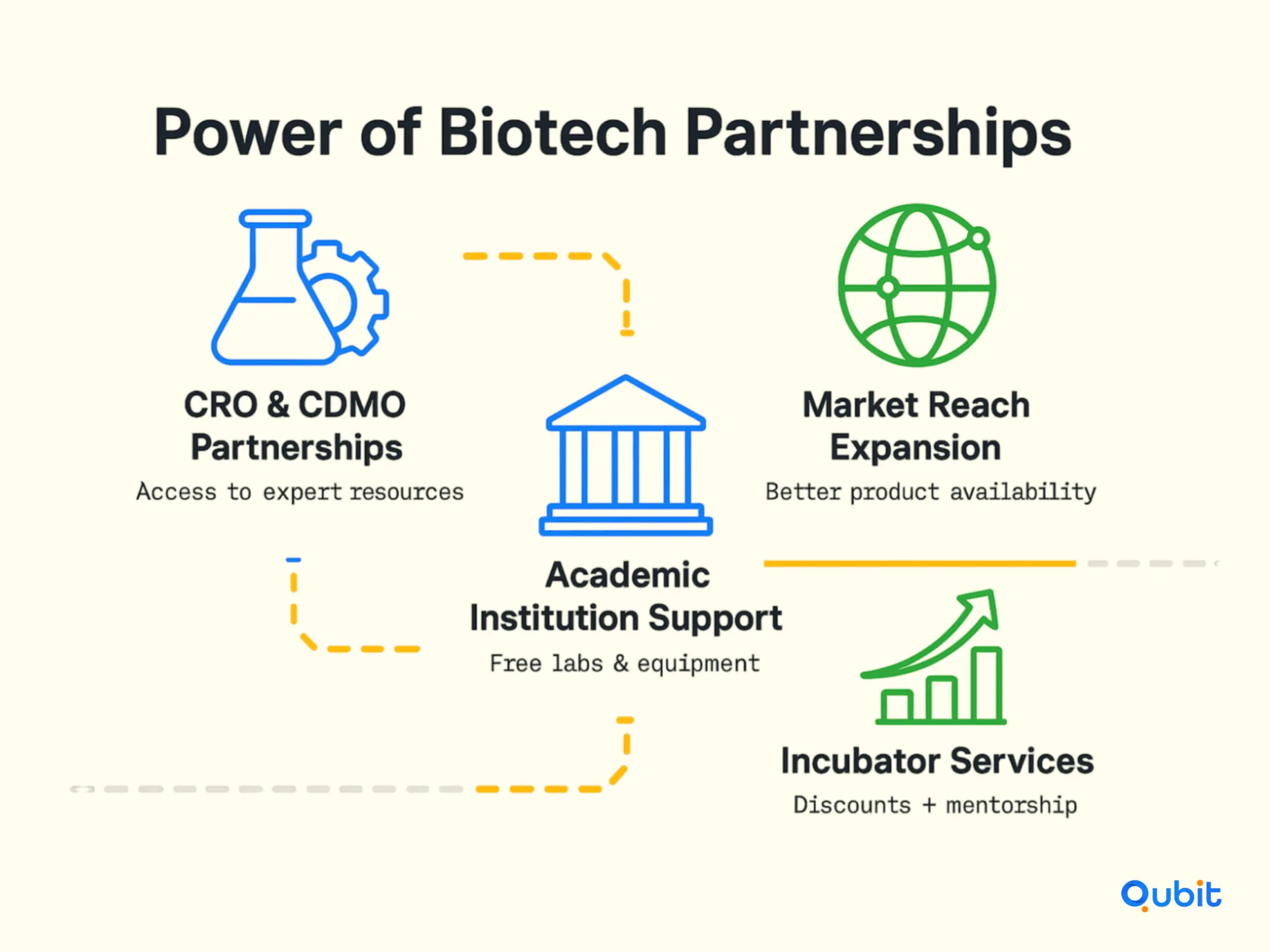Investors are drawn to startups that demonstrate a clear path to success, backed by robust data and strategic planning. Whether it's the strength of your scientific innovation or the clarity of your business model, understanding what investors prioritize can make or break your pitch.
A review of the biotech pitch deck example reveals how a well-crafted narrative and clear presentation structure can shape investor perceptions in the biotech field.
This article explores the critical factors biotech investors evaluate before committing their resources, offering actionable insights to help startups stand out in a competitive market.
Let’s jump right in!
Strategic Financial Decisions for Early-Stage Biotechs
The biotech sector is undergoing a significant transformation, with funding trends shifting dramatically. The cooling investment climate has led to a sharp reduction in IPO activity, as evidenced by the drop from 68 biotech IPOs in June 2021 to just 23 in June 2023. This decline, coupled with high development costs and low success rates, underscores the critical importance of strategic financial planning for emerging biotechs.
The Funding Landscape: A Competitive Arena
Investors are now prioritizing startups with advanced platform technologies, as highlighted by McKinsey on Biotech Investment Themes. According to their analysis, two-thirds of the $52 billion invested in therapeutic-based biotechs from 2019 to 2021 went to companies with cutting-edge platforms.
This trend emphasizes the need for biotech to differentiate themselves in a crowded market to attract funding.
Long-Term Implications of Early Financial Decisions
The financial choices made during the initial stages of a biotech's journey can have lasting consequences. Missteps in budgeting or resource allocation can hinder progress, especially in an environment where competition for funding is fierce. Careful planning and prioritization are essential to navigate the high costs of research and development while maintaining operational efficiency.
Emerging biotechs must adapt to this evolving landscape by focusing on innovation and strategic financial management. By doing so, they can position themselves for success despite the challenges posed by a cooling investment climate.
Planning for Long-Term Biotech Success
Building a biotech company demands more than just securing initial funding—it requires a vision that stretches far into the future. Founders who prioritize their exit strategies early can better align their business plans with long-term objectives, ensuring sustained growth and adaptability.
A well-defined exit strategy not only provides clarity but also helps founders anticipate market trends and position their company for future success. By focusing on long-term goals, businesses can align their operations with projected market growth and sustainability, creating a roadmap that attracts investors and partners alike.
Strategic planning that incorporates both immediate milestones and future aspirations ensures that biotech ventures remain competitive in a rapidly evolving industry. Founders who embrace this approach are better equipped to navigate challenges and seize opportunities that align with their overarching vision.
Developing Robust Intellectual Property for Biotech Innovation
A well-structured intellectual property (IP) strategy is the cornerstone of success for biotech companies. It not only shields groundbreaking innovations but also plays a pivotal role in attracting investor confidence. Strong IP ensures that scientific advancements are safeguarded, creating a pathway for commercialization without the risk of infringement or competition.
The case of Kalon Biotherapeutics exemplifies the importance of robust IP management. Referenced by Andrew Strong, Kalon’s approach to securing comprehensive patents highlights how emerging biotechs can establish a solid IP position. Their strategy demonstrates best practices for protecting proprietary technologies while fostering trust among stakeholders.
Raise Funds Carefully: Matching Investors with Your Vision
The right investors not only provide financial backing but also offer mentorship and industry connections that can accelerate your journey. Selecting investors who share your vision ensures long-term collaboration and minimizes potential conflicts down the road.
Strategic fundraising begins with identifying investors whose expertise complements your business goals. For instance, an analysis within financial modelling biotech seed round illustrates how numerical forecasting and milestone planning work together to clarify fiscal strategies for early-stage ventures. This approach helps startups present a clear roadmap, attracting investors who resonate with their vision.
Additionally, exploring diverse funding methods can broaden opportunities for startups. A look at biotech startup fundraising strategies presents a framework where different funding sources converge with the overall financial architecture supporting biotech ventures. These strategies help startups connect with investors who bring more than just money to the table.
Right Investor, Right Time: Aligning Funding with Growth Timelines
Matching funding phases with your development timelines ensures that resources are available when they’re most needed, whether for scaling operations or launching new initiatives. This alignment minimizes disruptions and allows businesses to focus on growth without financial bottlenecks.
Equally important is maintaining adequate cash reserves, especially during unpredictable market conditions. These reserves act as a safety net, ensuring operational stability and enabling businesses to weather volatility without compromising their strategic goals. Balancing timely funding with prudent cash management creates a foundation for sustainable growth, empowering businesses to seize opportunities while mitigating risks.
Biotech Investors & VC Insights: Unveiling Investment Perspectives
Venture capitalists and biotech investors often prioritize management teams with proven track records, as these demonstrate the ability to execute complex projects and navigate industry challenges effectively. A history of successful ventures can significantly boost investor confidence, making it a critical factor in funding decisions.
Equally important is transparent communication. Investors value honesty about a startup’s strengths and weaknesses, as it fosters trust and sets the stage for a collaborative relationship. A strong pitch should not only highlight the potential of the technology but also address risks and mitigation strategies, showcasing the team’s preparedness and foresight.
The Value of Partnerships in Biotech: Leveraging Strategic Collaborations

Collaborations in the biotech sector often serve as a cornerstone for innovation and efficiency. Partnering with Contract Development and Manufacturing Organizations (CDMOs) and Contract Research Organizations (CROs) enables companies to tap into specialized expertise and access critical resources that might otherwise be unavailable. These partnerships streamline complex processes, ensuring that projects progress with reduced risk and enhanced precision.
Strategic collaborations also open doors to broader markets, helping biotech firms expand their global reach. By working with experienced partners, companies can improve product bioavailability, ensuring that their innovations meet the highest standards of efficacy and quality. Such alliances not only optimize operational workflows but also foster long-term growth by aligning expertise with business goals.
Academic institutions have become vital hubs for early-stage biotech companies, offering resources that significantly reduce startup challenges. Universities often provide access to office spaces, laboratories, and cutting-edge equipment, enabling startups to focus on innovation rather than infrastructure costs.
Incubators within these institutions amplify this support by offering cost-effective solutions tailored to biotech needs. From discounted supplier rates to mentorship programs, these incubators foster an environment where groundbreaking ideas can thrive. Additionally, universities often facilitate collaborations with researchers, granting startups access to expertise and critical research support that would otherwise be prohibitively expensive.
By lowering entry barriers, academic settings empower biotech entrepreneurs to channel their energy into developing transformative solutions. This synergy between academia and industry not only accelerates innovation but also creates opportunities for startups to scale efficiently.
Take Full Advantage: Optimizing Regulatory and Strategic Opportunities
Maximizing the value of regulatory meetings and collaborations with Contract Development and Manufacturing Organizations (CDMOs) can significantly impact biotech success. Regulatory meetings offer a unique chance to gather critical clinical feedback, ensuring alignment with compliance standards and refining development strategies. These interactions are not just procedural; they are pivotal moments to address potential challenges and gain insights that shape the trajectory of clinical trials.
Collaborating with CDMOs further strengthens this process. Their expertise prepares biotech companies for investor reviews by enhancing operational readiness and showcasing strategic foresight. This dual approach—proactively engaging in regulatory discussions and leveraging CDMO partnerships—builds a robust foundation for investor confidence.
For biotechs aiming to stand out, optimizing these opportunities is not optional; it’s essential. By prioritizing these interactions, companies can refine their strategies, mitigate risks, and position themselves as credible, forward-thinking players in the competitive biotech landscape.
Conclusion
Securing investor interest requires a blend of preparation, strategy, and storytelling. From robust financial planning to protecting intellectual property, startups must lay a solid foundation for growth. Strategic fundraising, paired with a narrative-driven pitch deck, can significantly enhance your ability to captivate investors and communicate your vision effectively.
At Qubit Capital, we specialize in crafting pitch decks that resonate with investors and highlight your startup's potential. If you're ready to elevate your pitch, let us help you build a compelling deck that convinces investors. Contact us today.
Key Takeaways
- Early strategic financial decisions are critical in a cooling biotech investment climate.
- Strong intellectual property and regulatory planning enhance investor confidence.
- Aligning funding timelines with growth stages is essential for success.
- Effective pitch decks and strategic partnerships attract the right investors.
- Leveraging academic resources and collaborations can de-risk biotech ventures.
Frequently asked Questions
What are biotech investors looking for?
Biotech investors prioritize startups with solid financial planning, strong intellectual property strategies, and well-defined risk mitigation approaches. These elements demonstrate a company’s potential to achieve market success and sustain growth.


 Back
Back



